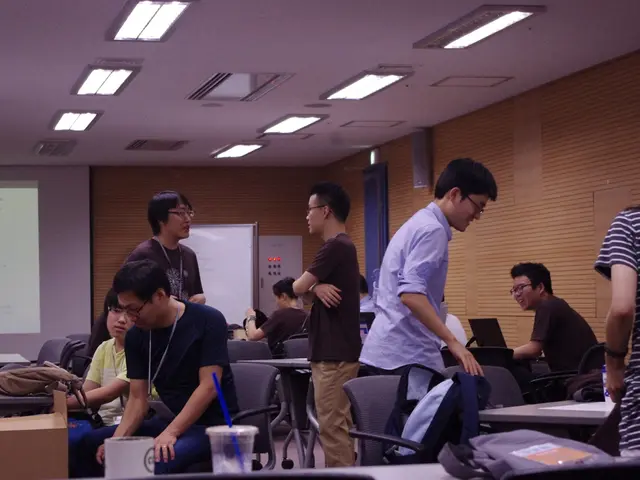Eastern European blockchain innovation surges forward, with Romania contemplating Solana as a potential avenue for growth and innovation.
Solana's Romanian Rise: A Quiet Tech Revolution
The world's eyes are on the Solana price, with its skyrocketing value pointing towards the growing interest in fast, affordable blockchain platforms. As of mid-April 2025, Solana (SOL) trades between $129 and $134, signaling a strong recovery after last year's market correction. But while the globe watches this digital coin, Romania—known for its fintech innovation—is subtly staking its claim in the Solana ecosystem.
From universities to startups, Romanian developers and entrepreneurs are exploring Solana's potential to create cutting-edge applications across industries like finance, logistics, and public services.
Romania 2.0: A Tech Powerhouse in the Making
With more than 140,000 IT professionals in the workforce, Romania ranks among the leading European countries in terms of software engineers per capita. The country's recent focus on product-driven innovations, especially in the fields of decentralized applications and fintech, indicates huge growth potential.
The European Blockchain Observatory took notice of Romania's blockchain activity in a 2024 report. They highlighted the emergence of new, efficient, and scalable ecosystems like Solana. The platform's ability to process over 65,000 transactions per second while almost eliminating fees makes it a top choice for developers working on consumer-focused tools.
In the cryptosphere, local groups such as Crypto Romania and Solana Romania on Telegram report that Solana price surges coincide with attendance at regional hackathons and developer meetups. This suggests a growing excitement among locals about market movements.
Romanian Startups Go Solana
Several Romanian startups have started incorporating Solana-based solutions in a variety of sectors, including digital identity and logistics.
A logistics tech company from Cluj is developing a freight tracking system on Solana's blockchain. It involves smart contracts that time-stamp checkpoints and automate payment upon cargo delivery. The appeal of Solana comes from its low network latency (approximately 400 milliseconds) and minimal transaction fees, crucial for real-time automation.
In the heart of Romania, Bucharest, fintech startup Vestinda is looking into Solana in the context of automating crypto investment portfolios. They plan to use low-cost blockchain technologies for automated trading execution controls, though the project is still in the testing phase.
Eastern European Institutions and Solana's Price
Institutional players, not just retail traders, are keeping a close eye on Solana's price. Recently, multiple asset management funds and VC firms in Romania have started testing Solana-based DeFi protocols. They are also studying the tokenomics and staking theories within the Solana ecosystem.
A cross-border application of Solana in energy trading and digital certificates was also granted by a Romanian blockchain think tank in partnership with DeFi researchers from Austria and Estonia. The initiative, hosted in Bucharest in March 2025, aims to unlock the multinational potential of Solana. Eastern European institutions are embracing crypto-sourced infrastructure to broaden their vision.
Romania's Government and Solana Adoption
The Romanian government is just beginning to implement blockchain technology in the public sector. In 2024, the Ministry of Research, Innovation and Digitalization set the groundwork for a sandbox project aimed at blockchain startups looking to develop civic tech features in collaboration with academic institutions.
Tangible diplomas or certificates issued by Romanian universities will receive verification through a blockchain system, which helps combat fraud attempts. The Technical University of Cluj-Napoca is considering using Solana's blockchain for backend restaurant technology due to its affordable timestamping and verification capabilities.
This step moves Romania closer to achieving the European Union's Digital Decade objectives, which include the creation of a digital identity and seamlessly integrated services. With Solana's technology, Romania has an excellent opportunity to integrate within the EU framework.
Romania's Secret Weapon: Skilled Workforce and Affordability
Romania's unique blend of skilled workforce and cost-effective operations makes it an ideal setting for scaling start-up companies. Solana's near-fee transactions and high throughput offer Romanian developers unprecedented opportunities in the blockchain space.
Moreover, remote-based tech companies from Romania are adopting Solana's technology to facilitate cross-border payments for engineers and creative freelancers. This streamlines payment processes, making Romania's freelancing economy more efficient.
Romanian Blockchain Facts and Figures
- Solana TPS (transactions per second): 65,000+ (theoretical)
- Average Solana transaction fee: less than $0.002
- Over 140,000 IT professionals work in Romania's tech sector
- Romania ranks among the top 3 Eastern European countries for developer density
- Key innovation hubs: Bucharest, Cluj-Napoca, Iași
Solana's Future in Romania: What Lies Ahead?
While Romania isn't leading the charge in blockchain adoption yet, it's certainly gaining momentum, especially among younger developers and fintech aficionados.
As Solana's mainnet stabilizes and the network grows, Cluj-Napoca, Bucharest, and Iași will likely become more significant players in Eastern Europe's Web3 innovation hubs.
With collaborations between Eastern European tech accelerators and an increasing number of local crypto-savvy engineers, Romania could establish itself as a Web3 innovation leader.
Conclusion
Romania's blockchain ecosystem is growing steadily but subtly, and Solana's influence on its evolution is undeniable. Universities, startups, and institutions are collaborating to push the boundaries of decentralized technology in Romania, showing that Solana's appeal extends beyond just its market value.
Time will tell whether Romania becomes a regional hub for blockchain innovation. But, with its talented workforce, supportive government, and potential for scalable and cost-efficient solutions from Solana, the future looks bright for this Eastern European country.
*This is a press release.
- Despite the global focus on the Solana price, Romania, a European country known for its fintech innovations, is subtly staking its claim in the Solana ecosystem, exploring potential applications across various industries such as finance, logistics, and public services.
- Several Romanian startups are incorporating Solana-based solutions, particularly in sectors like digital identity and logistics, to take advantage of the platform's low network latency and minimal transaction fees that are crucial for real-time automation.
- Eastern European institutions, including asset management funds and VC firms, are examining Solana's tokenomics and staking theories within the Solana ecosystem, as well as testing Solana-based DeFi protocols, signifying a growing interest in the technology among institutional players.
- Romania's government is implementing blockchain technology in the public sector, with plans to issue tangible diplomas or certificates through a blockchain system, potentially using Solana's blockchain due to its affordable timestamping and verification capabilities. This move could help Romania integrate within the EU framework and achieve Digital Decade objectives, such as creating a digital identity and seamlessly integrated services.






